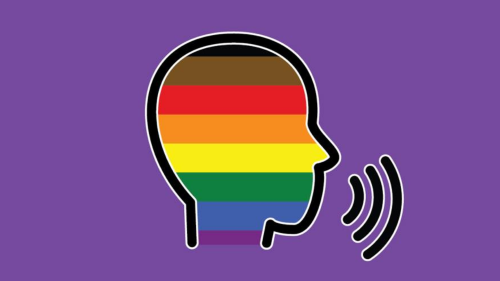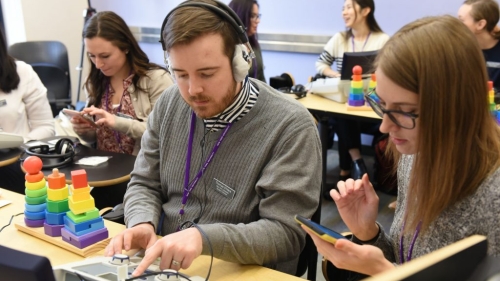“Community is so important and people often don’t realize how important it is until they have it,” said Dr. Charlie Lenell, an adjunct instructor and PhD alum of the Department of Communicative Sciences and Disorders (CSD).
Seeking to create a supportive space for queer-identifying students and allies in the department, Dr. Lenell founded the NYU CSD LGBTQ+ Clinical Club in Fall 2020 – a time when COVID-19 restrictions physically distanced the community. The club welcomes both undergraduate and graduate students in the department and aims to provide a safe space for students to discuss clinical challenges and facilitate community dialogue.
We connected with Dr. Lenell to learn more about the group and the importance of LGBTQ+ cultural competence in speech-language pathology.

How would you describe the goals and mission of the LGBTQ+ Clinical Club?
The purpose of this group is to support our LGBTQ+ students, who face unique challenges in both navigating their field placements as well as service delivery. The group provides a safe space to discuss these challenges and allows student clinicians to thrive in their clinical placements and beyond.
Overall, the club aims to support undergraduate and graduate students in the Department of Communicative Sciences and Disorders who identify as part of the LGBTQ+ community or allies through the following: community dialogue and engagement to increase awareness, creating shared resources for LGBTQ+ clinician students, and hosting educational events related to our field. Topics thus far have been gender-affirming voice evaluation and treatment, moving beyond the gender binary, and special considerations for clinical fellowship year.
How can speech-language pathologists (SLPs) and their patients benefit from increased LGBTQ+ cultural competence in the field?
From a patient perspective, it is important for SLPs to have foundational knowledge in LGBTQ+ culture to use appropriate terminology (such as pronoun use), to be aware of health disparities and stigmas that have negatively affected the LGBTQ+ community, and to have a better understanding of gender-affirming voice evaluation and treatment and how it differs from cisgendered heteronormative practices.
From a clinical perspective, it is important for SLPs to understand their own gender and sexual orientation to understand their perspective, internal biases, and privileges.
My hope is that this group will grow and flourish to support LGBTQ+ students and allies and allow them to be their authentic selves during their educational careers.
As a department alum, what does it mean to you to be involved in this club now as an adjunct?
I have really enjoyed interacting with students outside of the classroom environment. COVID-19 restricted my access to a physical community so launching the NYU CSD LGBTQ+ Clinical Club and joining L’GASP (the American Speech-Language-Hearing Association’s LGBTQ+ caucus) provided me with communities that benefitted me during the pandemic. One of my personal accomplishments over the past year was professionally “coming out” as nonbinary, and community from the Clinical Club and L’GASP was a big reason why I felt supported in doing so.
My hope is that this group will grow and flourish to support LGBTQ+ students and allies and allow them to be their authentic selves during their educational careers.
What has the impact of the club been so far? What are the goals for the future?
From an educational perspective, we received a lot of positive feedback following our first three educational meetings. From a social perspective, we have been building a virtual community on Facebook and Discord. We would love to see new faces at our social events – community is so important and people often don’t realize how important it is until they have it. Please join us!

Communicative Sciences and Disorders
665 Broadway, 9th floor
New York, NY 10012
Phone: 212-998-5230
